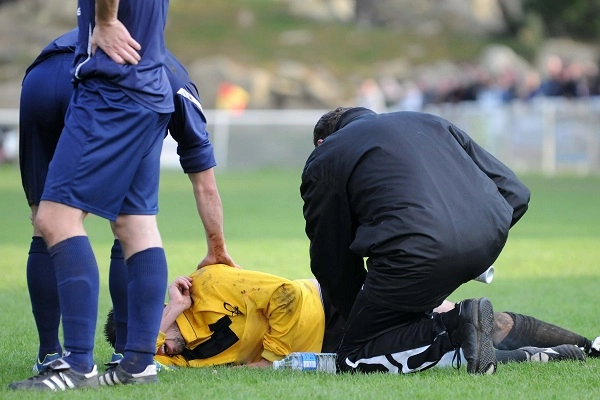What to do for a concussion


By Julie Jackson PT, ATC/R
As the “high-impact” sport season begins, please use your head!
That phrase is ironic, especially in soccer. Standing on the sidelines as an athletic trainer, I have an excellent view of this sport’s danger. In a recent match, when a player jumped to hit the ball with her head, her opponent lost her balance and swung her elbow into the girl’s temple.
When the referee gave me the signal, I rushed to check her. She slowly regained consciousness and held her neck in pain. I held my finger in front of her and asked her to follow its movement with her eyes. After I checked her memory and helped her off the field, I realized the hit had impaired her balance.
From all indications, she had suffered a concussion.
Sports injuries happen in the blink of an eye. Although strained muscles and sprains are more common, concussions happen more often than you’d think. They’re also not limited to sports. Falling off a bike or playground equipment can also cause them.
A concussion is the acute phase of an impact that directly changes the physiology of the brain. I carefully word it that way because concussions are not always caused by direct hits to the head. An athlete often lands on their shoulder or back, but the jarring impact of that fall causes trauma to the brain.
As an athletic trainer at Chemeketa Community College, I’m usually the first to assess this condition on the field. Symptoms include headache, dizziness; loss of consciousness, balance and memory; blurred vision and nausea.
The key to recovery is what neurophysiologists call “complete cognitive rest.” That means resting your brain from all activity involving your five senses. Find a dark room with little to no sound where you can lay down and rest. This is the most effective way to recover, rather than trying to turn off your brain by zoning out, playing video games or going for a drive.
Concussions can cause long-term side effects like delayed reaction times or lack of awareness. Experiencing one concussion puts you at greater risk of getting another.
What to do:
- Track all related symptoms: Are they increasing or decreasing?
- Take two mild 10-minute walks per day to keep the blood flowing and provide oxygen to the brain.
- Eat foods high in Omega-3, Omega-6 and other healthy fatty acids. This helps the brain recover from injury.
- If symptoms are not improving after a few days following the concussion, schedule an appointment with your primary care provider.
How to avoid them
Be aware of your surroundings during play and work on strengthening your neck muscles year-round. Please remember that “it’s just a game” that day, but your head needs to last a lifetime.
Julie Jackson is a certified and registered athletic trainer and physical therapist at Salem Health Rehabilitation Center.